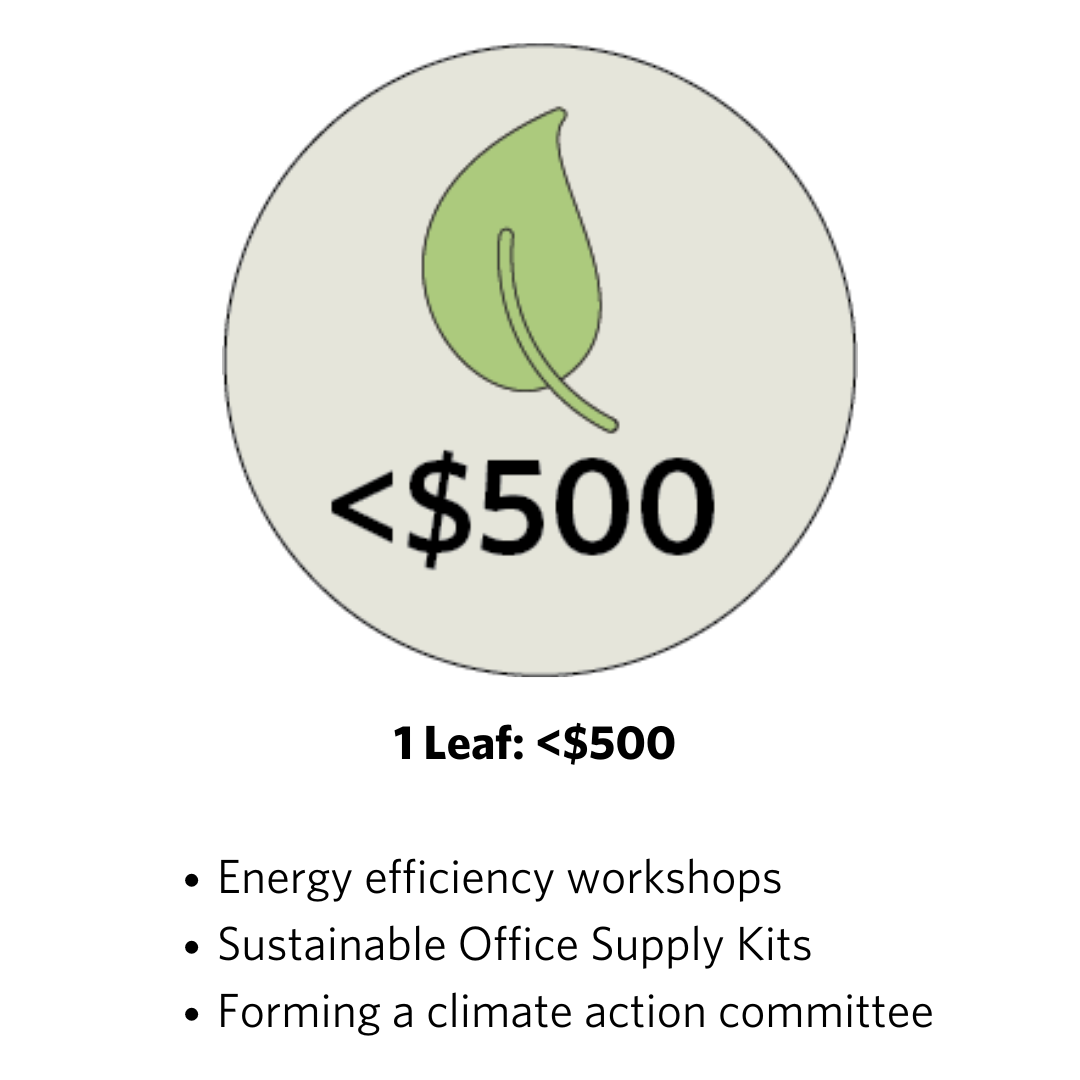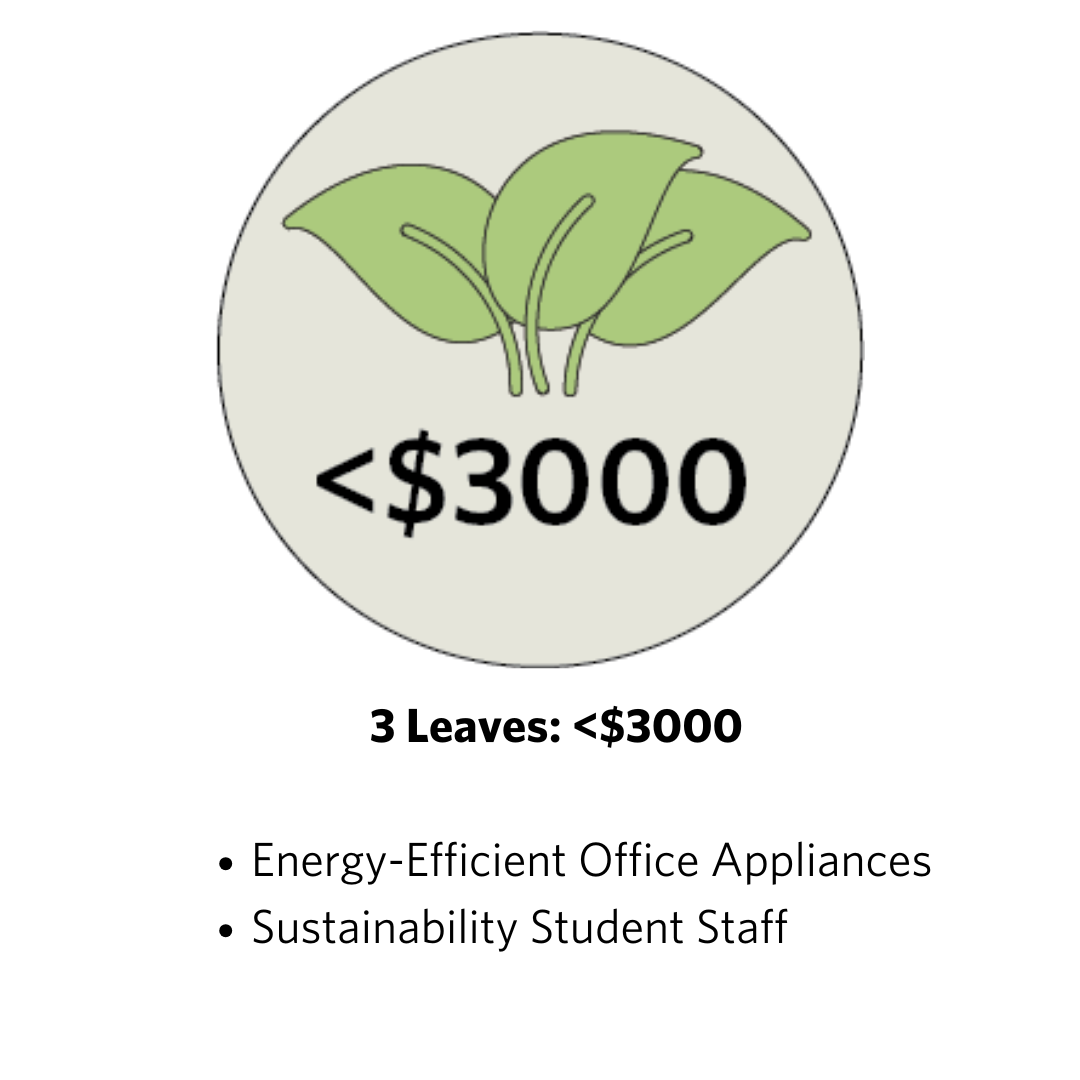The Workplace Sustainability Fund is available for Sustainability Coordinators seeking additional funding to bolster projects or initiatives within their respective units.
OVERVIEW
Do you have project idea for your department or unit? The Workplace Sustainability Fund helps turn ideas into action.
Funds are available annually for Sustainability Coordinators to pursue sustainability projects addressing at least one of the following focus areas:
- Climate Action
- Commuting
- Food Systems
- Waste & Materials (may include projects related to zero waste, reuse, recycling, procurement, circular economy)
- Education & Engagement (may include education/engagement on any of the listed focus areas -- see CAP2030 goal and this resource)
Thematic areas of projects funded over the years by the WSF:
ELIGIBILITY
Applicants to the fund must be registered Sustainability Coordinators.
Sustainability Coordinators in any workplace setting (e.g., offices, labs, facilities/maintenance/trades, food service, and retail outlets) are welcome to apply. However, priority will be given to projects based on the UBC Vancouver campus. Applications are open to coordinators at the Point Grey campus, Robson Square, Learning Exchange, and Teaching Hospital sites. SCs may partner with non-SC colleagues to design and implement a project, but the SC must be the primary applicant.
RANGE OF FUNDING OPPORTUNITIES WITH WSF:



Application info
Workplace Sustainability Fund applications will open January 5th 2026!
Funding application process:
- Review the funding criteria and complete the application form
- Submit applications via email to sc.program@ubc.ca
If you have any questions about eligibility, project suitability, or would like to learn more about the fund, please contact sc.program@ubc.ca.
2025/26 RECIPIENTS
Museum of Anthropology: Faculty of Arts Waste Diversion Network
This project aims to establish a Faculty of Arts waste diversion network to reduce landfill waste by collecting and recycling commonly used materials like polypropylene, plexiglass, and nitrile. Inspired by a successful lab plastics pilot, the initiative will engage departments such as MOA, LOA, and the Belkin Gallery to assess shared waste needs and identify sustainable solutions. The founders of this project hope to coordinate stakeholders, conduct a needs survey, build partnerships with local recyclers, and help locate a central collection site. The project supports UBC’s Climate Action Plan by promoting interdepartmental collaboration and improving recycling infrastructure within the Faculty of Arts.
Botany: Glove Recycling Program Extension
The Botany Glove Recycling Program, launched in 2022 by lab staff addresses the challenge of nitrile glove waste in UBC labs. Using TerraCycle Zero Waste Boxes, the program diverts gloves from landfills, supporting CAP30 goals. Initially piloted at the BRC and Biology labs, it expanded in 2024 to six locations across Botany and Zoology departments, including the Beaty Museum. With strong community engagement and volunteer support, it now benefits over 2,000 students, 35 research groups, and staff annually. The team plans to continue and grow the initiative, with regular monitoring and a report due to UBC Sustainability in 2026.
Applied Science: Sustainability Student Staff Program
As part of the APSC Sustainability Student Staff Program, this project promotes climate-conscious habits and environmental education in the workplace. Over a two-week period, staff will participate in a "Sustainable Office Challenge," adopting eco-friendly actions such as clean commuting, eating plant-based meals, and reducing energy use. Team-based tracking fosters engagement and accountability. Leading up to the challenge, workshops on waste sorting and energy efficiency are planned to be delivered, supported by new signage and practices. This initiative aligns with CAP2030 goals and aims to build a culture of sustainability through practical actions and workplace-wide education.
Land and Food Systems: Glove Recycling Program for Land and Food Systems
The Sustainable Agricultural Landscapes Lab in UBC’s Faculty of Land and Food Systems (LFS) is launching a glove recycling program using TerraCycle, inspired by successful initiatives in Botany and Zoology. The program aims to reduce single-use plastic waste by distributing 4–5 TerraCycle boxes across labs in the MacMillan Building, including SoilRes3 and PIEE labs. With support and guidance, the project will engage students, researchers, and staff, promoting sustainable lab practices. The team will monitor glove waste diverted and report findings to UBC Sustainability, supporting CAP2030 goals of waste reduction, education, and community engagement within environmentally focused research.
Zoology: Non labeled plastic recycling for the Biological Sciences and Beaty Buildings
The Zoology Department proposes a recycling program for unlabeled hard plastics like falcon tubes and pipette tip boxes, which are not accepted in UBC’s standard recycling. Partnering with a Research Associate from UBC’s Molecular Biology Lab, they plan to place prepaid Fisher Scientific recycling boxes in the Biological Sciences Building and the Biodiversity Research Centre. These containers will collect clean, unstamped plastics for processing into reusable products. Building on the success of their glove recycling pilot, this initiative aligns with UBC’s CAP2030 goals by promoting climate action, waste reduction, and education. The program could engage thousands of students and over 50 labs, potentially diverting 400+ pounds of waste.
Go Global: Go Global Sustainability Award
Go Global, under UBC’s Office of Global Engagement, launched a Sustainable Travel Award in 2024 to support students committed to climate-conscious travel and learning. With plans to expand the award in 2025, funding is requested to hire a Work Learn student who will enhance student engagement strategies and post-travel community sharing. This includes surveying student experiences, mapping sustainability opportunities at partner institutions, and developing pre-departure programming. The initiative supports over 2,000 outbound and 4,000 inbound students annually, aiming to influence global sustainability norms through UBC’s 200+ international partnerships, aligning with CAP2030’s goals on climate action and education.
Asian Studies: Sustainability Everyday: Climate Awareness & Community Building
The Department of Asian Studies is expanding its 2023–24 “Eco-Skills Workshop Series” with a new initiative, Sustainability Everyday: Climate Awareness & Community Building. This year’s project includes three interactive events- a UBC Botanical Garden tour, sustainable soap-making, and natural dyeing/handkerchief crafting- to promote everyday climate-friendly practices. The initiative emphasizes low-waste living, biodiversity, and sustainable commuting via coordinated carpooling. It also builds “climate communities” that foster shared reflection, action, and mutual support. Highlights and participant reflections will be shared via newsletters, aligning with CAP 2030’s goals for education, waste reduction, and increased community engagement.
Applied Science: Sustainable Office Challenge
The Sustainable Office Challenge by APSC promotes climate-conscious behavior and environmental literacy in the workplace through a fun, team-based initiative. Over two weeks, ~20 staff members will log daily sustainable actions- like plant-based lunches, active commuting, powering down workstations, or learning about climate issues. Preceding the challenge, workshops on Waste Sorting and Energy Efficiency will educate staff, support behavior change, and implement long-term practices like improved signage and rotating energy-saving duties. This initiative directly supports UBC’s CAP 2030 goals by fostering a culture of sustainability through hands-on engagement, peer motivation, and daily climate-positive habits.
Vantage College: Capstone Conference Green Initiative
Capstone Conference Green Initiative integrates sustainability into the 11th Annual Capstone Conference while fostering long-term, environmentally conscious event planning. Led by a student and peer mentor committee, the project focuses on greening the 2025 conference with eco-conscious catering, digital materials, sustainable speaker gifts, a climate-focused keynote, and a graduate student research panel. It also empowers students through leadership roles, honorariums, and recognition, and produces a Sustainability Impact Report and Green Conference Toolkit to guide future planning. Engaging around 200 participants and advancing UBC’s CAP 2030 goals, the initiative promotes measurable waste and emissions reductions, student-led climate action, and a culture of environmental responsibility.
Sociology: Sustainability Staff Student Program
The Sociology Department’s Sustainability Staff Student Program will hire a student to lead three climate-focused initiatives under the guidance of the Climate Action Committee. The student will conduct a departmental waste audit to inform sustainable purchasing practices, create a Sustainability Guide to support faculty and staff in adopting climate-conscious choices, and organize a climate anxiety and wellness event to engage the department community. These initiatives align with UBC’s CAP2030 goals by addressing waste reduction, air travel, education, and engagement. The program will foster lasting cultural change and promote everyday sustainability across the department’s faculty, staff, and student populations.
UBC Library: Botanical Garden Walk
The UBC Library IRC-Woodward Botanical Garden Walk will bring together members of the UBC Library #ClimateAction Team, Seed Lending Library Team, and colleagues to learn how botanical gardens are adapting to climate change. This tour will inform future seed selections for the library’s four seed lending libraries, supporting climate-resilient gardening and promoting native plants. It will foster biodiversity, inspire climate-conscious practices, and encourage ecological restoration. As an educational and community-building initiative, the walk will strengthen engagement across library branches and support CAP2030 goals related to biodiversity and climate-friendly food systems through informed, sustainable seed lending practices.
Psychology: Resilient Futures- Climate Stories and Action
The Psychology project, Resilient Futures: Climate Stories and Action, aims to inspire climate solutions by sharing personal climate action stories and addressing climate anxiety through workshops with psychologists and sustainability experts. It fosters a culture of climate awareness and emotional resilience within the department and UBC. By hiring a student coordinator, the project ensures sustained climate storytelling and engagement. Aligning with UBC’s CAP2030 goals, it promotes climate literacy, wellbeing, and community resilience. Anticipated outcomes include reaching 500+ participants and encouraging sustainable behaviors, measured through event attendance, surveys, and social media analytics.
Faculty of Education: Teaching for a Sustainable Future- Climate Action in the Classroom
The Teaching for a Sustainable Future project equips educators with curriculum-aligned, age-appropriate resources to teach climate change and sustainability effectively. It highlights practical classroom practices like waste reduction, energy-saving, and outdoor learning, incorporating Indigenous knowledge and holistic approaches. By fostering dialogue between educators and experts, the project inspires collaborative climate action in schools. Aligning with CAP2030, it focuses on engagement and outreach to build climate literacy and promote behavioral change in education. Anticipated outcomes include engaging 50 participants, reaching over 1,000 students, and tracking new sustainable classroom initiatives, fostering lasting community impact.
ADDITIONAL FUNDING OPPORTUNITIES
Learn more about additional funding opportunities for sustainability projects at UBC.
